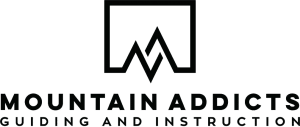Please bring the following items with you to the course:
- Lift ticket and downhill riding equipment may be required depending on field day location ($25 single-ride tickets available from Mountain Addicts)
- Lunch & Snacks: Bring a variety of small snacks to eat on-the-go, such as bars, jerky, cheese, as well as a sandwich is recommended. We don’t often have the time/weather for a lengthy sit-down lunch
- Water/Tea: A warm thermos of tea/hot chocolate as well as 1L of water, hydration packs are not recommended due to cold freezing the tube
- Skis: ‘Alpine Touring with touring bindings’ or ‘Telemark’. Please practice transitioning your bindings from ski-mode to walk-mode and back again. Mel Makepeace loves the Icelantic Nomad Lite for ski touring performance
or
- Split Board: with split board skins. Please practice transitions from touring mode to riding mode at home before the field day
or
- Ski Poles: recommended for all modes of travel
- Climbing Skins ‘Stick-on type’ (only required if using skis or split boards)
- Boots: we won’t be using our skis/boards for travel, only for building anchors, so please wear very warm winter boots
- Harness: a lightweight climbing-type harness with gear loops that can be put on over-top of your boots and outerwear
- 2 , 5m x 6mm cordalette
- 2 locking carabiners
- 2 non-locking carabiners
- Day Pack: large enough for spare clothes, lunch. 30 liter minimum size recommended
- Sunglasses and/or Ski Goggles: we recommend both as high output activities will fog up your goggles. Goggles with multiple lenses are especially handy; XSPEX Goggles “Chaos”
- Sunscreen
Optional Equipment: Not essential, but feel free to bring
- Chemical hand warmers& toe warmers packs
- Field Book & Pencil
- Compass, Inclinometer
- Ice-screw
- Selection of slings
- Pulley
- Micro traxion
- Tibloc
- Hollow bloc
Mountain Addicts has some gear available for rent, or check out the local ski shops.
